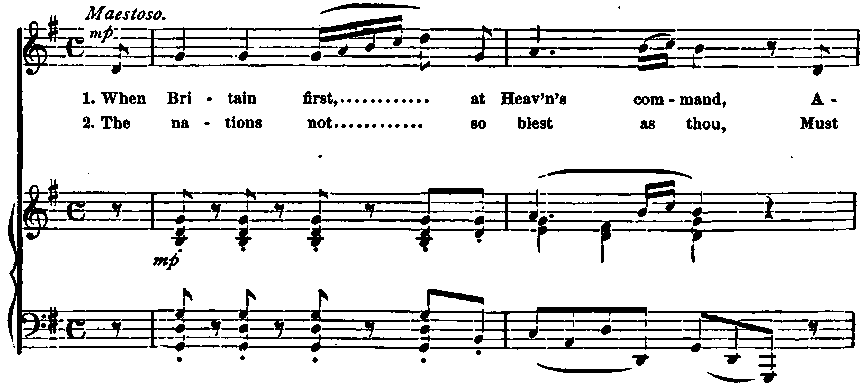Familiar Songs - Their Authors & Histories
300 traditional songs, inc sheet music with full piano accompaniment & lyrics.
| Share page | Visit Us On FB |
|
576 |
OUR FAMILIAR SONGS. |
||
|
RULE, BRITANNIA!
The English anthem of " Rule Britannia " has long been accredited to James Thomson, author of "The Seasons,-" but it is by no means certain that it is his. The. song first appeared in the masque of "Alfred," in 1740, which was written by David Mallet jointly. with Thomson. In the Masque, as altered by Mallet in 1751, three of the six original stanzas were omitted, and three additional stanzas, written by Lord Bolingbroke, were substituted. An editor of Thomson's works ascribes the original ode to Mallet, " on no slight evidence." For a long time the sopg was not included in the collected works of either. In 1755 Mallet brought out his "Masque of Britannia," at Drury Lane Theatre, and it was received with great applause. The Monthly Review, a Scottish magazine of the time, in noticing it, says: " Britannia, a masque, set to music by Dr. Arne. Mr. David Mallet is its reputed author. His design was to animate the sons of Britannia to vindicate their country's rights, and avenge her wrongs."
David Mallet was bom in Creiff, Perthshire, Scotland, about 1700. When very young, he was a janitor of the High School at Edinburgh. He became tutor in a family residing near that city, and prosecuted his studies at the University.
The air of "Rule, Britannia" was composed by Dr. Thomas Arne, who was born in 1704, the son of a wealthy upholsterer in London. He was educated at Eton, and his father designed him for the law, but while pursuing his studies, the boy used to satisfy his craving for music by dressing in servants' livery and sitting in the upper gallery at the theatres. He learned to play with the strings of his spinet muffled in a handkerchief. One day his father was shown into a gentleman's house where a musical party was in full blast, and to his amazement and disgust, his own son occupied the post of first fiddler. From that time he was allowed to play at home, and soon the family became exceedingly proud of his achievements. He taught his sister to sing. She had a charming voice, and he wrote an opera for her which had a run of ten nights. She became the famous Mrs. Cibber. Arne wrote the first English music that rivalled Italian in compass and difficulty. His greatest work was the music to " Comus." He died March 5,1778. While attempting to illustrate a musical idea, he sang an air in faltering tones; the sound grew fainter, until song and breathing ceased together. |
|||
 |
|||